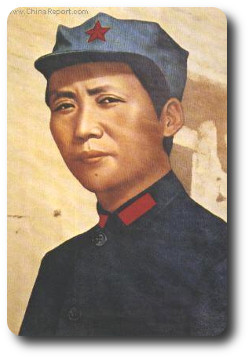Topic: Military Theory

What is Guerrilla Warfare?
Yu Chi Can (Guerilla Warfare), by Mao Tse-Tung, translated by Brigadier General Samuel B. Griffith, USMC (retired), from the United States Marine Corps FRFRP 12-18, Mao Tse-Tung on Guerrilla Warfare, 1989.
 In a war of revolutionary character, guerrilla operations are a necessary part. This is particularly true in a war waged for the emancipation who inhabit a vast nation. China is such a nation, a nation whose techniques are undeveloped and whose communications are poor. She finds herself confronted with a strong and victorious Japanese imperialism. Under these circumstances, he development of the type of guerrilla warfare characterized by the quality of mass is both necessary and natural. This warfare must be developed to an unprecedented degree and it must coordinate with the operations of our regular armies. If we fail to do this, we will find it difficult to defeat the enemy.
In a war of revolutionary character, guerrilla operations are a necessary part. This is particularly true in a war waged for the emancipation who inhabit a vast nation. China is such a nation, a nation whose techniques are undeveloped and whose communications are poor. She finds herself confronted with a strong and victorious Japanese imperialism. Under these circumstances, he development of the type of guerrilla warfare characterized by the quality of mass is both necessary and natural. This warfare must be developed to an unprecedented degree and it must coordinate with the operations of our regular armies. If we fail to do this, we will find it difficult to defeat the enemy.
These guerrilla operations must not be considered as an independent form of warfare. They are but one step in the total war, one aspect of the revolutionary struggle. They are the inevitable result of the clash between oppressor and oppressed when the latter reach the limits of their endurance. In our case, these hostilities began at a time when the people were unable to endure any more from the Japanese imperialists. Lenin, in People and Revolution, said: "A people's insurrection and a people's revolution are not only natural but inevitable." We consider guerrilla operations as but one aspect of our total or mass war be cause they, lacking the quality of independence, are of themselves incapable of providing solution to the struggle.
Guerrilla warfare has qualities and objectives peculiar to itself. It is a weapon that a nation inferior in arms and military equipment may employ against a more powerful aggressor nation. When the invader pierces deep into the heart of the weaker country and occupies her territory in a cruel and oppressive manner, there is no doubt that conditions of terrain, climate, and society in general offer obstacles to his progress and may be used to advantage by those who oppose him. In guerrilla warfare, we turn these advantages to the purpose of resisting and defeating the enemy.
During the progress of hostilities, guerrillas gradually develop into orthodox forces that operate in conjunction with other units of the regular army. Thus the regularly organized troops, those guerrillas who have attained that status, and those who have not reached that level of development combine to form the military power of a national revolutionary war. There can be no doubt that the ultimate result of this will be victory.
Both in its development and in its method of application, guerrilla warfare has certain distinctive characteristics. We first discuss the relationship of guerrilla warfare to national policy. Because ours is the resistance of a semicolonial country against an imperialism, our hostilities must have a clearly defined political goal and firmly established political responsibilities. Our basic policy is the creation of a national united anti-Japanese front. This policy we pursue in order to gain our political goal, which is the complete emancipation of the Chinese people. There are certain fundamental steps necessary in the realization of this policy, to wit:
1. Arousing and organizing the people.
2. Achieving internal unification politically.
3. Establishing bases.
4. Equipping forces.
5. Recovering national strength.
6. Destroying enemy's national strength.
7. Regaining lost territories.

